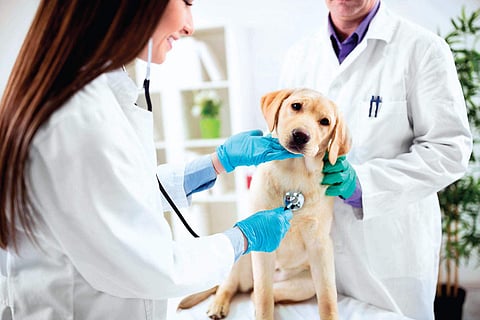

CHENNAI: Leptospirosis, a dangerous disease, is caused by a type of bacteria called Leptospira and can be transmitted directly from animal urine or indirectly via contaminated water. Your dog can contract the disease through direct contact with another infected animal, by eating infected meat or most commonly through contact with anything that has been contaminated by the urine of an infected animal. Most infections occur when dogs go swimming in and/or drink infected water, but in reality anything (plants, dirt, objects or water) can be a potential source of infection. The bacteria can penetrate damaged skin or intact mucosa (eg lining of the mouth).
Following infection, some dogs become long-term carriers while appearing healthy. If not treated immediately, the disease is often fatal to the animals. Unfortunately, leptospirosis infections may be present with any number of rather vague, non-specific symptoms that can vary in intensity.
Vaccines can be effective in providing protection against this disease, but no vaccine provides 100 percent protection against the infection. This may be the case with leptospirosis as there are multiple strains of the organism. Dogs usually recover from mild infections, although the time for recovery varies. In many of these dogs, even those that appear to be completely recovered, small numbers of bacteria survive in the body, especially in the kidney.
The damage caused by the bacteria often leads to liver failure or kidney failure, and sometimes both. In the case of severe infection, the damage is irreversible and quickly becomes fatal. Severely infected dogs show signs of lethargy, depression, loss of appetite, vomiting, fever, and increased thirst and urination. Dogs may develop jaundice, which means the lining of the mouth and the sclera of the eyes turn yellow. In some cases, there may be bleeding. Illness typically develops quickly, sometimes in just a few days, and can be fatal. In most of cases, dogs with mild infections may show little or no signs of illness and the disease may go undetected.
If left unattended, Lepto can be fatal. Besides a vet prescribed treatment plan, focus on rehydration and hygiene of your pet. You can also take some basic steps to help decrease your dog’s risk of exposure to Leptospira. Try to minimise your dog’s contact with stagnant water and animals like rodents. Be very careful during outdoor trips, hikes and swimming in the open. In cities, see to it that your pet does not drink water from puddles or eat any animal excreta.
One common precaution you can take to keep your pet safe is to always carry drinking water. Rats are common carriers of the disease, so Lepto can be found in large urban areas where rodents are a problem. They might transmit the disease after drinking in a puddle or leaving droppings on streets or in kennels where dogs are housed.
If your dog shows any symptoms associated with Leptospirosis, consult your veterinarian. Lepto is typically treated with antibiotics but recovery varies based on the severity of the case. The outlook can be positive for the pet if the disease is caught early, but there’s still chance of permanent liver or kidney damage. Little is known about Lepto in cats, although it is rare and only mild cases are heard about.
Stay vigilant for the sake of your pet’s safety. The author is a former corporate executive actively involved in rescues, rehabilitation, and re-homing of dogs